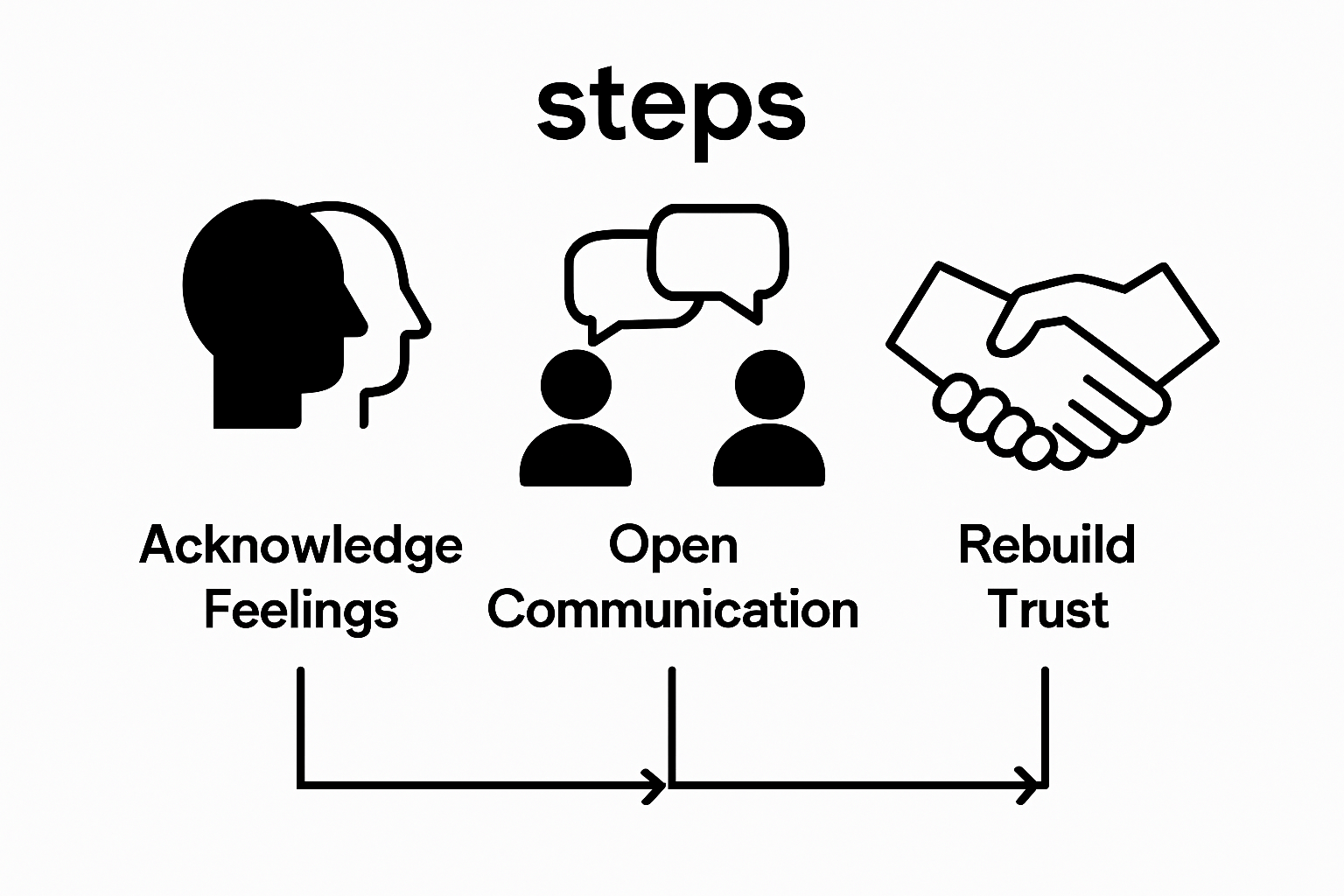Steps to Heal After Infidelity: Build Stronger Bonds
Healing after infidelity might feel impossible at first. Nearly 70 percent of couples struggle to fully rebuild trust after a betrayal, and most never find a clear path forward. Still, the real shock is that total forgiveness is not actually the finish line. The real turning point comes from tiny moments of honesty that slowly reshape what you thought was broken.
Quick Summary
| Key Point | Explanation |
|---|---|
| 1. Acknowledge emotions without judgment | Validate your feelings of hurt or anger, allowing yourself to feel and reflect on your emotional state honestly. |
| 2. Communicate openly and safely | Create a judgment-free zone for honest conversations, focusing on understanding rather than assigning blame. |
| 3. Seek professional help together | Engage with a therapist to navigate emotional complexities and develop tools for healing and rebuilding trust. |
| 4. Establish clear boundaries | Define mutual, specific boundaries to create a safe and transparent environment for both partners. |
| 5. Rebuild trust through consistent actions | Demonstrate reliability and accountability daily, as small actions build a foundation of restored trust over time. |
Step 1: Acknowledge Your Feelings Honestly
Healing after infidelity begins with one critical step: honestly confronting your emotional landscape. This initial stage isn't about blame or judgment, but about creating a safe internal space to recognize and validate the complex emotions erupting inside you. When betrayal occurs, your feelings become a complex emotional terrain of hurt, anger, confusion, and potentially grief.
Start by giving yourself explicit permission to feel everything without censorship. Too often, individuals try to minimize their pain or rush toward forgiveness, which only delays genuine healing. Your emotions are valid signals, not weaknesses. Whether you experience intense rage, profound sadness, or a numbing shock, each reaction represents a legitimate response to betrayal.
Understanding Your Emotional Spectrum
To truly acknowledge your feelings, practice emotional mapping. Find a quiet, private space where you can reflect without interruption. Consider journaling or speaking aloud to yourself about what you're experiencing. Name your emotions specifically: Are you feeling betrayed, humiliated, frightened, or abandoned? Precise emotional labeling helps transform overwhelming sensations into manageable insights.
Professional counseling can provide structured guidance during this process. Explore our compassionate trauma support to understand how therapists can help you navigate these intense emotional waters. Many individuals find professional support crucial in transforming raw pain into constructive healing.
Remember that emotional acknowledgment isn't linear. Some days you might feel intense anger, other days profound sadness. This fluctuation is normal. Trust your emotional journey and resist the urge to rush or suppress your genuine reactions. Healing requires patience, self-compassion, and a willingness to sit with uncomfortable feelings without judgment.
Successful completion of this step means you can articulate your emotions without becoming overwhelmed. You should feel a sense of emotional clarity emerging - not necessarily resolution, but a deeper understanding of your internal experience. Your feelings are your compass, guiding you toward authentic healing and potential relationship restoration.
This checklist table outlines crucial criteria that indicate successful completion of each phase of healing after infidelity.
| Healing Phase | Completion Criteria |
|---|---|
| Emotional Acknowledgment | Able to articulate emotions clearly and calmly. |
| Open Communication | Both partners feel validated and not defensive. |
| Professional Support | Regular attendance and active participation in therapy. |
| Boundaries Set | Mutual agreement and ongoing review of boundaries. |
| Trust Rebuilding | Noticeable consistency in trustworthy behavior. |
| Mutual Healing | Shared sense of hope and gradual restoration of intimacy. |
Step 2: Communicate Openly with Your Partner
Communication after infidelity requires extraordinary courage and vulnerability. This step transforms painful silence into a pathway for potential healing, allowing both partners to express their deepest emotions, fears, and hopes with radical honesty. Open communication isn't about assigning blame, but creating a shared understanding of what happened and why.
Begin by establishing ground rules for your conversations. Safe communication means creating a judgment-free zone where both partners can speak without interruption or immediate defensive reactions. Choose a neutral, private environment where you both feel comfortable. This might be a quiet room in your home, a neutral counseling space, or during a scheduled walk where physical movement can help release tension.
Creating a Safe Communication Framework
Practical communication requires structured approaches. The betrayed partner should have uninterrupted space to express their pain, while the partner who was unfaithful must listen without becoming defensive. Use "I" statements that describe your feelings without attacking. For example, "I feel deeply hurt" instead of "You destroyed our relationship." This approach reduces emotional escalation and creates space for genuine understanding.
Learn strategies for rebuilding relationship trustwhen communication feels overwhelming. Professional guidance can provide structured techniques for navigating these challenging conversations.
Be prepared for emotional complexity. Some conversations might be short, others might last hours. Some might end in tears, anger, or silence. Healing is not linear. The goal isn't perfect resolution in one conversation, but creating a foundation of honest, compassionate communication. Active listening means truly hearing your partner's pain without immediately trying to fix or minimize their experience.
Successful communication in this stage means both partners feel heard, validated, and committed to understanding each other. You'll know you're making progress when conversations become less about accusation and more about mutual healing. The key is patience, empathy, and a shared commitment to rebuilding trust, one vulnerable conversation at a time.
Step 3: Seek Professional Help Together
Seeking professional help is a powerful commitment to healing that transforms individual pain into collective recovery. This step isn't about assigning blame or determining fault, but creating a structured, supportive environment where both partners can navigate the complex emotional landscape of infidelity with expert guidance.
Choosing the right therapist requires careful consideration. Look for professionals specializing in couples therapy and trauma recovery, specifically those experienced in addressing infidelity. The right therapist acts as a neutral facilitator, helping you both understand the underlying dynamics that contributed to the betrayal while providing tools for rebuilding trust and intimacy.
Navigating Therapeutic Support
Initial therapy sessions might feel uncomfortable and emotionally charged. Be prepared for intense conversations that explore deep-seated relationship patterns, individual vulnerabilities, and communication breakdowns. The goal isn't to assign permanent blame but to understand how the relationship reached this point and how you can collectively move forward.
Explore our comprehensive couples counseling approachesto understand how professional support can transform your relationship. Therapists can provide specialized techniques that help partners process betrayal trauma, rebuild emotional connection, and develop healthier relationship strategies.
Both partners must approach therapy with genuine commitment and openness. This means being willing to examine personal contributions to relationship dynamics, listen without defensiveness, and invest time and emotional energy into the healing process. Some couples might require individual therapy alongside joint sessions to process individual emotional experiences fully.
Successful completion of this step means both partners feel supported, understood, and equipped with practical tools for rebuilding their relationship. You'll know you're making progress when therapy conversations shift from examining the painful past to constructing a shared vision for your future. Remember, seeking help isn't a sign of weakness but a courageous step toward genuine healing and potential relationship transformation.
Step 4: Establish Clear Boundaries Going Forward
Boundaries are the foundation of rebuilding trust after infidelity. This critical step transforms abstract healing into concrete action, creating a framework of mutual respect, transparency, and accountability. Establishing clear boundaries isn't about punishment, but about creating a new relationship architecture that feels safe and predictable for both partners.
Begin by having an honest, detailed conversation about what boundaries mean to each of you. Transparency becomes your new relationship currency. This might include sharing passwords, being open about social interactions, or establishing guidelines about communication with potential romantic interests. The key is mutual agreement and consistent follow-through.
Creating Your Relationship Roadmap
Boundaries should be specific, measurable, and mutually understood. For the partner who was unfaithful, this might mean complete access to communication devices, detailed accounts of daily activities, and proactive communication about social interactions. For the betrayed partner, boundaries might include setting expectations about emotional and physical intimacy, rebuilding trust through consistent actions.
Learn more about rebuilding relationship trustto understand how specific boundaries can transform your relationship dynamic. Professional guidance can help you craft boundaries that are both meaningful and sustainable.
Understand that boundary-setting is an ongoing process. What works today might need adjustment tomorrow. Regular check-ins are crucial. Schedule monthly conversations to review and adjust your boundaries. This isn't about micromanaging, but about maintaining open communication and demonstrating commitment to healing. Be prepared to be vulnerable, listen actively, and show genuine willingness to understand each other's needs.
Successful boundary establishment means both partners feel heard, respected, and secure. You'll know you're making progress when boundaries feel less like restrictions and more like a shared commitment to rebuilding your relationship. The goal is creating a new relationship foundation built on trust, transparency, and mutual understanding.
Step 5: Rebuild Trust Through Consistent Actions
Trust is rebuilt through microscopic moments of integrity, not grand gestures. This step transforms abstract promises into tangible, daily demonstrations of commitment. Rebuilding trust requires patience, vulnerability, and a persistent commitment to transparency that goes far beyond mere words.
Consistent actions mean showing up differently every single day. For the partner who was unfaithful, this involves proactive communication, complete honesty about whereabouts, and demonstrating genuine emotional availability. Small, repeated behaviors become the building blocks of restored trust. This might mean sending unprompted check-in messages, being consistently where you say you'll be, and voluntarily sharing information that could potentially trigger suspicion.
The Architecture of Trustworthy Behavior
Trustworthy actions are intentional and deliberate. They require self-awareness and a genuine commitment to personal growth. The betraying partner must demonstrate accountability without defensiveness. This means accepting responsibility for past actions, showing genuine remorse, and actively working to understand the root causes of their betrayal.
Discover comprehensive strategies for relationship recoveryand understand how consistent actions can transform your relationship narrative. Professional guidance can provide structured approaches to rebuilding trust effectively.
The betrayed partner also plays a crucial role. Learning to receive these trustworthy actions requires emotional courage. This means being willing to gradually lower defensive walls, recognizing efforts of genuine change, and communicating your healing process openly. Trust reconstruction is a collaborative journey that demands vulnerability from both partners.
Successful trust rebuilding isn't measured by perfection but by consistent, honest attempts at connection. You'll know you're making progress when trust feels less like a constant negotiation and more like a natural, mutual understanding. The goal is creating a relationship where transparency becomes second nature, and both partners feel emotionally safe and genuinely heard.
Ready to Rebuild Trust After Infidelity?
If you recognize yourself in the journey outlined above—navigating betrayal, painful emotions, and the need for clear boundaries and honest action—you do not have to heal alone. At South Denver Therapy, we understand how heartbreaking and overwhelming infidelity can feel. Our caring therapists specialize in helping couples communicate openly, create safety, and rebuild stronger bonds. Every step you take toward healing matters, and expert guidance can make all the difference when trust feels fragile.
Take the first step toward real change right now. Explore our couples counseling services if you want dedicated support for relationship recovery. If you or your partner are struggling with the trauma of betrayal, see how our trauma support and EMDR therapy can help you process pain and move forward with confidence. If you’re stuck in the ‘Should I stay or should I go?’ spiral, discernment counseling in Castle Rock can help you decide from a calmer, more grounded place. The sooner you reach out to South Denver Therapy, the sooner you can start to feel whole again. Book your appointment today and begin building a safer, more trusting future together.
Frequently Asked Questions
How can I start the healing process after infidelity?
Healing begins by acknowledging your feelings honestly. Give yourself permission to feel a range of emotions without judgment, and consider journaling or seeking professional help to navigate these intense feelings.
What should I communicate with my partner after infidelity?
Open communication is crucial. Establish ground rules for discussions, create a safe environment, and use "I" statements to express feelings without blaming the other person. Aim for mutual understanding rather than assigning blame.
Why is professional therapy important after infidelity?
Professional therapy provides a neutral space for both partners to explore the emotional complexities of infidelity. A qualified therapist can introduce structured approaches to healing, helping couples rebuild trust and intimacy while addressing deeper relationship patterns.
How do I establish boundaries to rebuild trust after infidelity?
Start by having detailed conversations about what boundaries mean for each partner. These should include agreements on transparency and accountability, along with regular check-ins to adjust as needed, ensuring both partners feel secure and respected.



